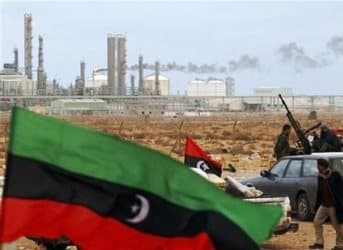A U.S. report on the 2012 attacks in Benghazi highlighted longstanding concerns about the threat level in Libya. The interim report from the House of Representatives followed an attack this week that left parts of the French Embassy in Tripoli destroyed by a car bombing. Last year's attack on the U.S. consultate in Benghazi left U.S. Ambassador to Libya Chris Stevens and three of his staff members dead. Libya has struggled with post-conflict stability and reconstruction tied to its oil sector. The government there said this week it wanted to increase oil production, echoing sentiments about offshore natural gas exploration from French supermajor Total. Political ambitions aside, the security situation may be such that Libya is not quite ready for prime time, however.
An interim report by Republican leaders on the House Foreign Affairs Committee found the State Department, then led by Hillary Clinton, knew there were heightened security risks in Benghazi but went ahead and cut back on security personnel at the consulate anyway before the deadly September attack.
Committee Chairman Ed Royce, R-Calif., said "bureaucratic failures" at the State Department left embassy personnel vulnerable in Libya. The report didn't include any internal document to support Republican claims. Committee Democrats lashed out at their counterparts for politicizing the debate and U.S. Secretary of State John Kerry told lawmakers last week he'd do anything to allay any legitimate concerns, but stressed there are "a lot more important things to move on to and get done."
Related article: The Implications of the EU’s Lifting Sanctions on Syria’s Oil
The day before Kerry's testimony, an international group monitoring the safety of journalists warned of further conflict in Libya. Less than a week later, much of the French Embassy in Tripoli lay in ruins after it was hit by a car bomb.
The Libyan government said recently it was investigating a blast on an oil pipeline that can carry as much as 70,000 barrels per day. Around 15,000 former rebels are employed as sort of an oil gendarmerie to ensure gains made since the end of civil war remain in place. The Oil Ministry said it was looking to capitalize on those gains by shooting for an oil production level of around 1.7 million barrels per day. Libyan officials this week said production stood at around 1.5 million bpd, just shy of pre-war levels.
The Libyan government said it was looking to increase oil output even further once it can ensure that production levels are static. Production began increasing midway through civil war and has held steady, more or less, at around the 1.5 million bpd mark. French supermajor Total said at an energy conference in Tripoli this week it was ready to start exploratory drilling for natural gas offshore as early as May. The company is already producing around 41,000 bpd offshore and another 35,000 bpd at the onshore Mabrouk field.
Related article: Will Syrian Oil Developments Mirror Libya's?
The oil sector in Libya may be on the path toward recovery despite lingering security concerns. While U.S. questions over the State Department's response in Benghazi are likely nothing more than partisan sniping, concerns about Libya's state of affairs extend beyond "bureaucratic failures." A British government statement on the French Embassy attack reflected concerns about national security in most major cities across the country. Libya's own probe into an oil pipeline blast said "it is not good" if the incident were attributed to an act of sabotage, indicating security concerns aren't just foreign. By its own admission, Libya has its work cut out in terms of national security. Attacks in January in neighboring Algeria hint that al-Qaida views energy as an important target. If Libya is serious about oil production gains, it needs to show it can parallel those ambitions with security gains.
ADVERTISEMENT
By. Daniel J. Graeber of Oilprice.com


















